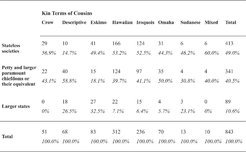Kinship and Political Systems
Günther Schlee is investigating the interaction between political and kinship structures – and the deep history of their combined development. He combines a comparative approach – drawing on the Ethnographic atlas, among other sources – with insights from his own and others’ ethnographic research. A particular interest is the social and political implications of different terminology types.

The Table – taken from a recent article by Schlee (2017) – relates Murdock’s standard kin-term classification (based on the structure of cousin terms) to the level of political organization. Although there is a great deal of free-play in the relationship, it is noticeable that full state institutions are a good deal rarer in societies with what Morgan called ‘classificatory’ kinship systems (Murdock’s Crow, Omaha, Iroquois and Hawaiian) than among those with Morgan’s ‘descriptive’ systems (Murdock’s ‘Descriptive’, ‘Eskimo’ and ‘Sudanese’). Schlee refers to contemporary ethnographic studies in Africa and Central Asia – including studies of both functioning lineage systems and societies undergoing economic ‘modernisation’ – to illustrate the curtailment of extended kin relationships and the changes in kin-term usage that accompany the growth of state power. It is likely that similar social processes accompanied the formation of the first state societies in the ‘High-Culture-Belt’ that included the Mediterranean, South and East Asia, and the societies of Central America and Peru.
